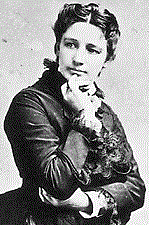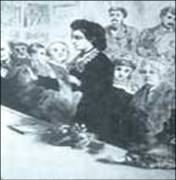 |
| (Schneir, Miriam. |
History is full of people ahead of their time: Rene Descartes, Galileo Galilei, Socrates, Plato, and so many more. These people lived their lives trying to bring about their vision of the future. However, they were condemned to social exile for their radical beliefs, be it a new view of the world, its opportunities, or its people. A prime example of one such person is Victoria Claflin Woodhull, born 1838 in Homer, Ohio, to Reuben Buckman Claflin and Roxanna Hummel Claflin. Surrounded by a rather eccentric family, Woodhull learned to stand by abnormal beliefs. Leading a life unlike those of other girls her age, Woodhull developed unique values and supported opinions unheard of during her time. For instance, Woodhull believed that women had the same capabilities as men, an idea that shaped the rest of her life. Woodhull and her sister founded the first woman-owned stock-brokerage and started an influential, though controversial, newspaper, Woodhull and Claflin’s Weekly. Woodhull also fought for women’s rights, especially for suffrage. She was the first woman to personally present her views to a high congressional committee, giving a speech regarding the right to vote to the Judiciary Committee of the House of Representatives in 1871. The following year, Victoria Woodhull became the first female candidate for the presidency. She ended her years in England, never having left her lifelong goal for righteousness or renouncing her controversial beliefs. Victoria Claflin Woodhull spent her life trying to help others and bring about a change by defying the norm. Her confidence and strength in standing up for her beliefs make her a true hero.
The extent to which she proved her courage demonstrated Woodhull’s commitment to her cause. She proved that she had the courage to defy the norm of the 1800’s, to try something unheard of, and to change people’s minds about women’s capabilities. She truly believed people’s mindsets could be altered, and understood that words would not be enough: the world needed actions as proof.
“While others argued the equality of women with men, I proved it by successfully engaging in business; while others sought to show that there was no valid reason why women should be treated, socially and politically, as being inferior to men, I boldly entered the arena.... I now announce myself candidate for the Presidency.’ Thus Woodhull became the first woman candidate for president, headlining the ticket of the National Radical Reform Party (also known as the Equal Rights Party)” (“Woodhull, Victoria C. (1838-1927)”).Woodhull applied the well-known phrase “People may not believe what you say, but they will always believe what you do.” In order to prove to the world that she could be anything a man could be, Woodhull even cropped her hair and wore men’s clothing. She was outspoken and believed in her cause, trying to bring it into the light of day in any way possible: “She declaimed boldly that ‘we mean treason; we mean secession...we are plotting revolution...we will overthrow this bogus Republic and plant a government of righteousness in its stead’” (Siddali). Victoria Woodhull wanted to earn women the rights of men by any means, be they peaceful or a complete change of government. She risked treason for the right to vote, an extreme that most other women would not undergo. Woodhull proved her courage in her risk-taking for a revolutionary cause that she held close to her heart.
Victoria Woodhull advocated the women’s rights movement by denouncing commonly held conceptions about women. The women’s rights movement was aimed at helping women gain the right to vote and have an active voice in their government. Woodhull tried to prove what women are capable of through actions, not words. “All this talk about women's rights is moonshine. Women have every right. They have only to exercise them. That's what we're doing” (“Woodhull, Victoria C. (1838-1927)”). Woodhull pointed out that women can do anything that men can do, and gave herself as an example: she not only founded a newspaper and stock-brokerage, but ran for president of the United States of America, earning her place in history as the first female to do so. Woodhull knew that most people would not accept a woman president at that time, but she insisted on running for office anyway, if only to prove that a woman has the courage to lead. Her argument continued that since she was able to achieve these things, women were obviously capable of voting responsibly. Woodhull’s goal to allow women the right to vote revealed her astute sense of righteousness. She understood the opposition she would face, and kept going anyway. In her speech to the Judiciary Committee of the House of Representatives, Woodhull proclaimed:
“The citizen who is taxed should also have a voice in the subject matter of taxation. "No taxation without representation" is a right which was fundamentally established at the very birth of our country's independence; and by what ethics does any free government impose taxes on women without giving them a voice upon the subject or a participation in the public declaration as to how and by whom these taxes shall be applied for common public use? Women are free to own and to control property, separate and free from males, and they are held responsible in their own proper persons, in every particular, as well as men, in and out of court. Women have the same inalienable right to life, liberty, and the pursuit of happiness that men have. Why have they not this right politically, as well as men?” (Woodhull).Victoria Woodhull attempted to show people not that she was right, but that they were wrong in their interpretation and application of the document on which their lives were based. Woodhull attempted to help the women’s suffrage movement by changing a view firm in people’s minds for nearly one hundred years.
 |
| (myhero.com/.../Woodhull/g1_u9532_woodhull6.jpg) |
Although Woodhull had some eccentric and controversial beliefs, her ability to stand up for them shows her truly inspiring strength of character. Her unwavering self-confidence led Woodhull through all of her life. Victoria Woodhull believed in free love, and though this jeopardized her influence as a suffragette, she stood by this belief until her death. Her newspaper, Victoria and Claflin’s Weekly, often explored the topic of free love, and through it she congratulated some people for their scandalous affairs, earning her a negative reputation. Her publication and encouragement of free love led to her arrest, unluckily on Election Day of 1872, so she received no votes. However, even after being arrested and publicly scorned for her beliefs, Woodhull still stood by them. Declaring herself clairvoyant as a child, Woodhull knew that she had to trust herself if she wanted to succeed. This trust may have gone a bit too far, as “her megalomania was full-blown. Lionized as suffragism's most electrifying speaker, she called herself ‘the evangel’ and claimed her spirits had told her she was destined to rule the world” (King). Woodhull trusted her instincts, though her beliefs were often considered far-fetched and eccentric. Without this trust, she would surely have made different, and less risky, decisions in life.
Victoria Woodhull provides an example and inspiration to people with grand plans for the future. To this day, no woman has succeeded in gaining the presidency, though with the passing of the 19th amendment women have gained the right to vote. Others have followed in her footsteps of change by working towards something completely new and unheard of, such as Martin Luther King Jr.’s quest to end segregation and to bring equal rights to another neglected group of individuals. However, Woodhull’s most lasting and inspiring message is strength in oneself and one’s beliefs. This strength, as it did for Woodhull, allows for courage, perseverance, and success, for just as Woodhull’s favorite spirit Demosthenes told her: “Your work is about to begin.”
Page created on 5/20/2010 12:00:00 AM
Last edited 5/20/2010 12:00:00 AM
